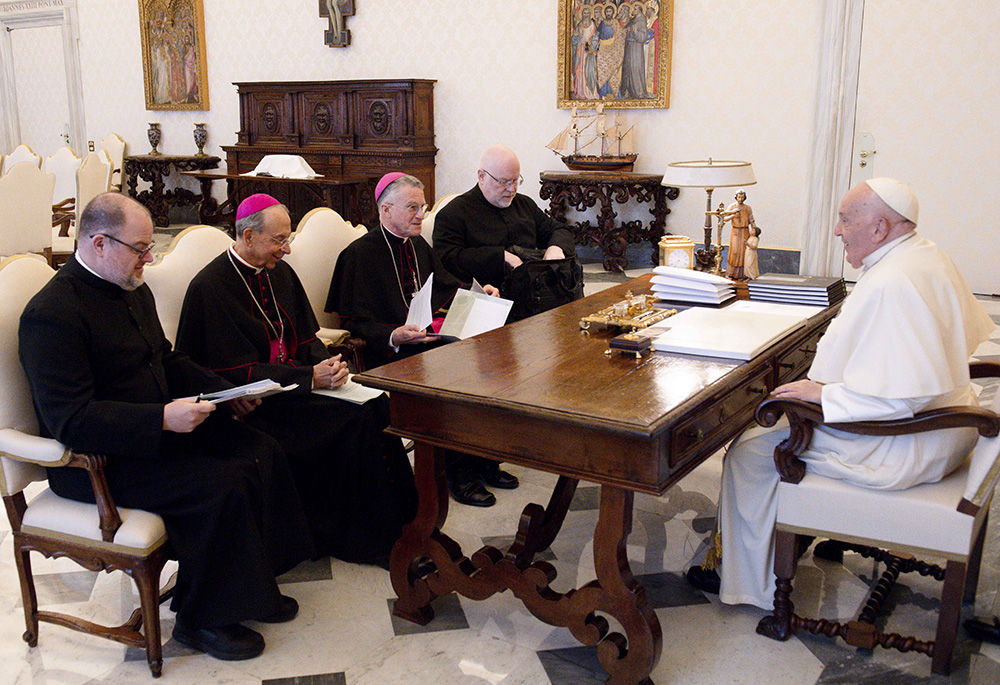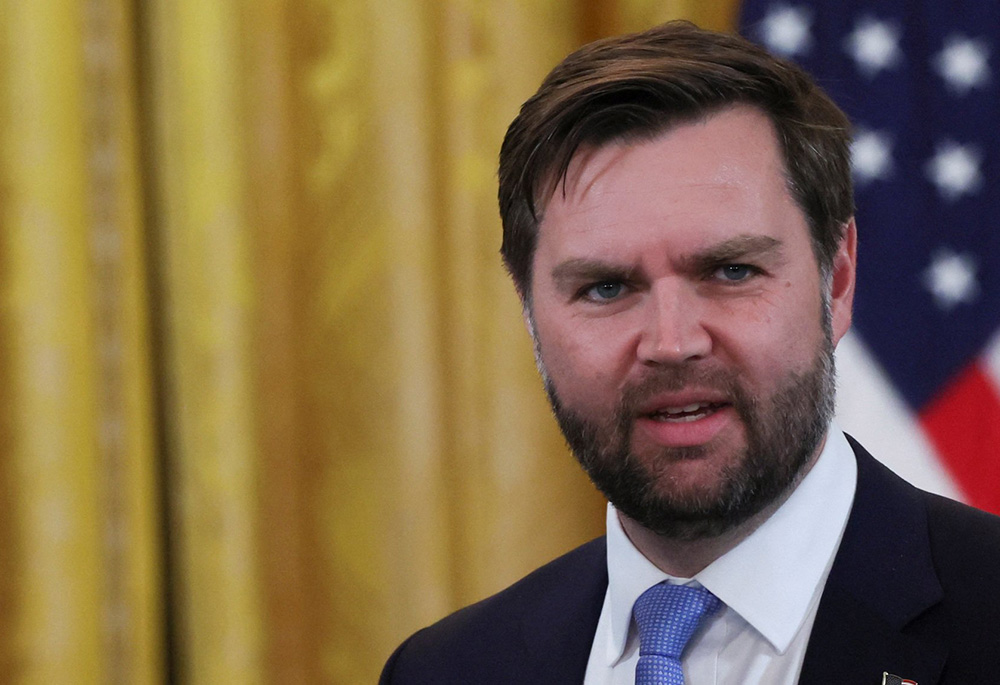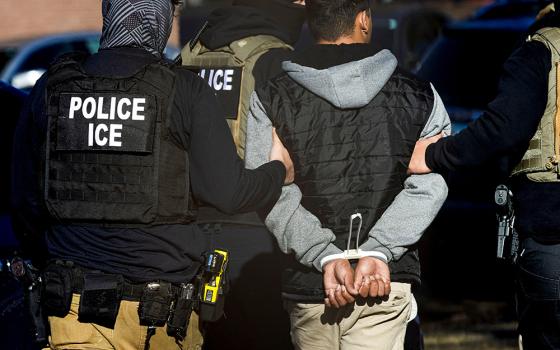
Pope Francis holds his spring meeting with the officers of the U.S. Conference of Catholic Bishops April 18, 2024, at the Vatican. Seated from left are: Fr. Michael J.K. Fuller, the conference's general secretary; Archbishop William Lori of Baltimore, vice president; Archbishop Timothy P. Broglio, president and head of the U.S. Archdiocese for the Military Services; and Fr. Paul B.R. Hartmann, associate general secretary. (CNS/Vatican Media)
It is not every day that the pope publicly scolds a group of bishops. Those unfamiliar with the tone and wording of papal texts can be forgiven for thinking Pope Francis' letter to the U.S. bishops was merely one of encouragement. It wasn't. The pope spoke because the U.S. bishops' conference and too many of its members have been appallingly silent and unprepared to take protective action as the Trump administration begins implementing its policy of mass deportations.
Archbishop Timothy Broglio, president of the bishops' conference, issued a tepid statement Jan. 22, two days after President Donald Trump took the oath of office. Broglio spoke of policies that are "are deeply troubling and will have negative consequences, many of which will harm the most vulnerable among us." There was no urgency. The words did not reflect the stakes. You would not have known that the administration was rounding up migrants, many of them Catholics, indiscriminately, denying them due process and justifying the roundup by lumping criminals with those who overstayed a visa.
Bishop Mark Seitz of El Paso, Texas, who chairs the Committee on Migration, issued a stronger statement condemning "several of the executive orders signed by President Trump this week [which] are specifically intended to eviscerate humanitarian protections enshrined in federal law and undermine due process, subjecting vulnerable families and children to grave danger." He also issued a joint statement with Catholic Charities USA President Kerry Alys Robinson and Mercy Sr. Mary Haddad, president of the Catholic Health Association. Other bishops have spoken up on their own.
It is the lack of national leadership that has been shocking. There have been no press conferences. At the national level, there have not been any "all hands on deck" conference calls to make sure our ministries are equipped to shield migrants from these arbitrary and unjust roundups of migrants. There has been no nationwide second collection to fund the work of the office of migrant and refugee services. There have been no lawsuits to seek an injunction against Trump's unlawful stoppage of monies appropriated by Congress or his abrogation of contracts already signed.
Advertisement
Some bishops were worse than silent. Archbishop Joseph Naumann of Kansas City, Kansas, penned a column in his archdiocesan newspaper that repeated GOP talking points. "Allowing violent gangs, individuals with serious criminal histories, dealers of lethal illegal drugs, human traffickers and those who pose threats to our national security to enter our country and harm U.S. citizens is a serious dereliction of duty by our elected leaders," Naumann said. "I commend President Trump and those in his administration for addressing this serious, national threat."
Naumann has no sense of proportion. Praising any aspect of Trump's immigration policy at this moment is like noting that Eva Braun was good to the cats. Besides, if he turned off Fox News one night, he could easily find reports indicating that undocumented migrants commit far less crime than citizens.
The pope issued his letter to give the bishops the language they have been unable or unwilling to articulate. He called the situation a "major crisis." Pope Francis bluntly assessed the consequences of such moral failure: "What is built on the basis of force, and not on the truth about the equal dignity of every human being, begins badly and will end badly." His appeal was straightforward. "I exhort all the faithful of the Catholic Church, and all men and women of good will, not to give in to narratives that discriminate against and cause unnecessary suffering to our migrant and refugee brothers and sisters."
Broglio's response to the pope's letter was weak. But, really, what could he say after being spanked so publicly?
Cardinal Blase Cupich of Chicago offered the best comment about the pope's letter. In an interview with Vatican News, he said that "the protection and advocacy for the dignity of migrants" is "the preeminent urgency at this moment." The bishops' conference has labeled abortion "our preeminent priority" in its voting guide since 2019.

Vice President JD Vance attends a joint press conference in the East Room at the White House Feb. 4 in Washington. (OSV News/Reuters/Leah Millis)
Pope Francis also offered a paragraph of catechesis to Vice President JD Vance, whose foray into medieval theology was sophomoric. Call it Hillbilly theology. The pope wasn't having it: "Christian love is not a concentric expansion of interests that little by little extend to other persons and groups. In other words: the human person is not a mere individual, relatively expansive, with some philanthropic feelings!...The true ordo amoris that must be promoted is that which we discover by meditating constantly on the parable of the 'Good Samaritan' (cf. Lk 10:25-37), that is, by meditating on the love that builds a fraternity open to all, without exception."
Bishop Robert Barron's Word on Fire ministry published a defense of Vance's mangling of the ordo amoris. The defense, like the original, failed utterly to grasp the fact that in the faces of the poor and the suffering we encounter the face of Christ. Otherwise, there has been a dis-incarnation and the church's belief that it is the body of Christ has no meaning.
The pope did not consult me about his letter. I second his objection to Vance's manipulation of a venerable doctrine, but I would have registered a different concern.
The pope did not consult me about his letter. I second his objection to Vance's manipulation of a venerable doctrine, but I would have registered a different concern. Love, like all theological virtues, must be ordered, but love is not a limited commodity. Quite the contrary. Love begets more love. In grace, we encounter that limitless, unbounded, superabundant love that Christ bestowed on us all.
The pope's letter to the U.S. bishops is a milestone. As my colleague Christopher White noted, the letter grew out of the pope's profound understanding of what ails the church in the United States: its sectarian quality, its susceptibility to ideological ferment, and its complicity in the culture wars. Pope Francis reminds us of the parable of the good Samaritan, which was so central to the call for a politics rooted in compassion in his encyclical Fratelli Tutti. If the bishops of the U.S. have ears, let them hear.
If the bishops of the U.S. have ears, let them hear.





